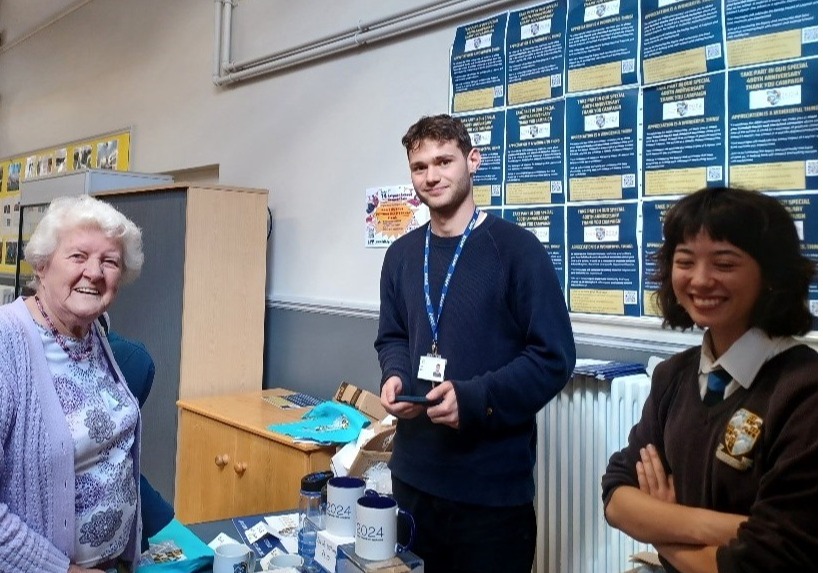Article republished on 8th May 2025 to mark the 80th anniversary of VE Day. Originally published here on 29th July 2024.
Doreen Ashley, née Cundy, joined the Latymer School in 1941 and left in 1947. She was married to Alan Ashley, class of 1948, who passed away in 2008.
This interview took place in June 2024, when Doreen came to the school to meet the Latymer Links team to share her unique perspective on her Latymer school days during the 1940s and more! We were delighted to see Doreen again at the annual reunion in July, where she received a special mention for being the oldest former student present.
 Doreen at the 2024 reunion with Gabe Warren (class of 2023) and Tara (current student).
Doreen at the 2024 reunion with Gabe Warren (class of 2023) and Tara (current student).
When were you at Latymer and which House were you in?
Between 1941 and 1948 and I was in Latymer house. The house system back then was very important, and we even had all the house competitions too, where I particularly enjoyed playing hockey for my house.
What were your favourite extra-curricular activities here?
There wasn't much opportunity to set up any of these activities because of the uncertainty of the war. Some of the staff were away in the Services too so this made it even more difficult. We did have the Girls Training Corps (GTC) though which I was involved in throughout the war.
What was it like being a female student in the 1940s?
There definitely was a divide between the things that the male and female students did. The boys would do metalwork and woodwork whilst we had to do more 'domestic' tasks like cooking and sewing which I hated but all other lessons were taken together.
There used to be a separate boys end and girls end of the school as well, with different entrances that we had to use.
Everyone was ultimately united together as there was nothing else going on for our age group at this period. There were also many female staff at the school too, so no imbalance on that front.
How was your experience of the war at Latymer?
We tried to keep a daily routine but it was almost impossible due to the sirens going off. I walked to and from school four times a day but if the sirens sounded at any time of the day I had to either turn home or find any place of shelter.
We also had to carry our gas masks around everywhere and always be alert to any situation. There was tape on all the windows on the corridors and brick walls constantly being built to reduce the effect of any blast, as well as ditches dug in the field.
Furthermore, we had whole school assembly every morning, so about 1,000 students all packed in every day, which was another way we tried to keep some form of routine.
Despite this, I found that Latymer offered me some form of stability in this deeply uncertain and scary time. It was somewhere that I knew I would be each day and provided some form of certainty in and amongst all the chaos. I can't say I enjoyed any of the uncertainty as it was such a frightening period but think I would describe the school as an 'anchor' to me during the war.
Was the teaching influenced by the war?
I don't recall the war being talked about too much at school, we were all just living it so there wasn't really any need to. All the lessons were often interrupted by the sirens however, and we had to go our allotted places in a corridor.
We did all the usual subjects that are still in place now, I think. I used to hate physics and maths but really enjoyed English literature.
What was school like when the war ended?
Everything was still deeply unsettled at Latymer even after the war ended and still in a mess, as was life in general. Rationing continued and there was no form of organisation with anything.
I don't think there was much change at all at the school despite the war ending. Any changes took place gradually.
What did you do after you left Latymer?
I stayed on a couple of terms after matriculation as I wasn't sure what I would do after, as a lot of us did. There was little preparation for what to do in a post war world provided to us.
But after studying touch typing and particularly shorthand from one of the masters (Mr Morris) during the newly developed Sixth Form, I was able to land my first job at the Oxford University Press in the city office as a proofreader.
I absolutely loved my time there, as English literature was always one of my favourite subjects at school. I worked in the children's book department where I would keep all the records of the progress of every manuscript that came in that would go off to the printers, focusing on each different stage in the process.
I stayed there eight years but was unfortunately made to leave as the company did not employ married women! But I would say it was definitely the right first job for me.
I was also able to do a lot of travelling with my husband (also a Latymer boy in my year) all around the world, where we had a brilliant time.
What makes Latymer special to you?
I think the fact that it provided me with the best form of stability it could at such a tumultuous time will always mean it is a special place for me.
How do you like to spend your free time?
I've been in a choir for 25 years, so that is something I still greatly enjoy. I've also joined lots of the local societies like the National Trust and the Over 50s forum, where we work to solve issues in the borough, alongside The Enfield Society which I am also a member of.
What piece of advice would you give to this year's leavers?
Be friendly and respectful to everybody no matter their background or differences. I think you should always make an effort to be kind to anyone you meet.


 Doreen at the 2024 reunion with Gabe Warren (class of 2023) and Tara (current student).
Doreen at the 2024 reunion with Gabe Warren (class of 2023) and Tara (current student).